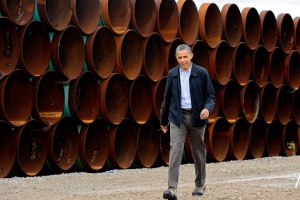As a result of Sandy’s devastation of the east coast (killing 38 people and causing billions of dollars in damage), political figures began speaking out about lowering greenhouse gas emission and having our nation better prepared for “super storms.” I can now breathe a breath of relief, I KNOW this stuff! Finally, at the end of my blogging journey, my issue takes the forefront of the debates, and I could not be more ecstatic because of my ability to interpret the situation and enlighten others about its implications. But, to inform you more thoroughly, I found several news articles particularly interesting.
In a major announcement on November 1st, Mayor Michael R. Bloomberg announced his decision to endorse President Barack Obama. Bloomberg had been highly critical of both candidates during the presidential debates, citing their failure to address the highly important issue of climate change. Bloomberg said that Obama was the better candidate to deal with climate change, and also highlighted the fact that Sandy could have been due to climate change. Bloomberg wrote in an editorial:
“The devastation that Hurricane Sandy brought to New York City and much of the Northeast — in lost lives, lost homes and lost business — brought the stakes of next Tuesday’s presidential election into sharp relief. Our climate is changing. And while the increase in extreme weather we have experienced in New York City and around the world may or may not be the result of it, the risk that it may be — given the devastation it is wreaking — should be enough to compel all elected leaders to take immediate action.”
Mr. Bloomberg’s endorsement could help Obama win independent voters around the country, and this would hold significant implications for the election.
The super-storm not only caused political figures to address the issue of climate change, but it also is directly affecting the election by dominating news coverage and halting both presidential candidate’s campaigns.
I encourage you all to look at these articles about Sandy’s election impact:
2. On Hurricanes, Presidents, Climate and One Clear Human Factor in the Sandy Disaster






